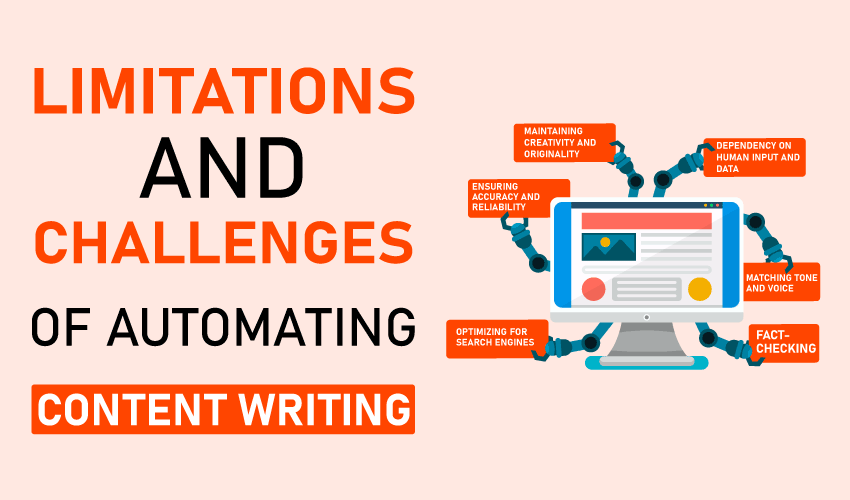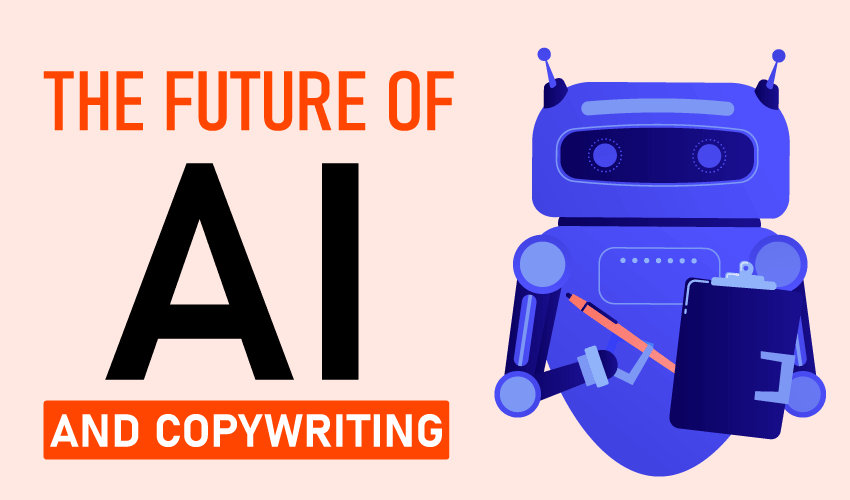Will AI Replace Copywriters?
This question is on the mind of many copywriters Will AI replace copywriters? Or Will Content Writing Be Automated? This thought can be unsettling, as writers possess a unique set of skills and expertise that no machine can replicate.
However, it is important to delve deeper into the topic and explore the role of AI in content creation. While AI tools can assist with tasks such as content planning, optimization, and SEO, the fear of complete replacement seems misplaced.
In this blog post, I will examine the applications of AI in content creation and explore why human copywriters continue to hold a vital place within the industry.
So, let’s uncover the potential impact of AI on copywriting and discover why writers still have an irreplaceable edge in the realm of content creation.
Exploring the Role of AI in Content Creation: From Planning to Implementation
It’s important to note that AI in content creation isn’t about replacing human writers; it’s about enhancing their capabilities. By leveraging sophisticated technologies such as Natural Language Processing (NLP) and Natural Language Generation (NLG), AI content creation tools have revolutionized the way content is planned, produced, and optimized.
AI tools serve as valuable assistants, providing data-driven insights and streamlining time-consuming tasks. Ultimately, they empower writers to focus on their strengths: crafting unique and engaging content that resonates with their target audience.
Content Planning
One of the key areas where AI proves invaluable is in content planning. AI content planning tools assist writers in conducting thorough research and analysis.
Assistance in SEO Efforts
When it comes to SEO, AI tools are a copywriter’s best friend. AI-powered keyword research tools can help writers identify the most relevant and high-performing keywords for their content. These tools analyze search trends, user behavior, and competition, allowing writers to optimize their content for better search engine results.
Read More: Labrika – Is It the Best AI-Powered SEO Tool?
Content Optimization
AI also plays a crucial role in content optimization. AI-powered tools can automatically check for spelling and grammar errors, ensuring that the final piece of content meets the highest standards of quality and professionalism.
Limitations and Challenges of Automating Content Writing
AI can automate certain aspects of content writing, but there are inherent challenges that preclude it from completely replacing human copywriters. AI lacks the creativity, emotional intelligence, and adaptability that only human writers can provide.

01. Dependency on Human Input and Data
AI tools have the ability to automate certain aspects of content creation, they are heavily reliant on human input and data. These tools require marketers or copywriters to provide the necessary data, descriptions, and relevant details to generate content.
02. Maintaining Creativity and Originality
AI can generate content based on data and patterns, but it lacks the ability to think creatively and inject emotions into writing. Copywriters bring a unique perspective and creative flair that cannot be replicated by machines.
03. Ensuring Accuracy and Reliability
AI tools rely on the information fed into them, which may not always be accurate or up-to-date. Copywriters, on the other hand, can critically analyze and fact-check information before incorporating it into their content. They possess the ability to validate sources, verify data, and ensure the accuracy and reliability of the content they create.
04. Matching Tone and Voice
Copywriters have the expertise to adapt their writing style and tone of voice based on the target audience, brand guidelines, and specific content goals.
AI, on the other hand, may struggle to match the desired tone and voice, which can result in content that feels robotic or inconsistent. Copywriters excel in capturing the brand’s personality and effectively communicating the desired message.
05. Optimizing for Search Engines
AI tools can assist with keyword research and optimization to improve content visibility, copywriters bring a deeper understanding of SEO strategies and trends. They can optimize content organically, ensuring that it is not only keyword-rich but also valuable and engaging for readers.
Copywriters can also adapt to algorithm changes and stay updated with the latest SEO best practices, resulting in content that consistently performs well in search engine rankings.
06. Fact-Checking
Copywriters play a crucial role in ensuring the accuracy and credibility of the content they produce. They have the ability to conduct thorough research, verify facts, and properly attribute information. AI tools may struggle with fact-checking, as they rely on the data inputted without the ability to independently verify the information.
The Value of Human Copywriters
AI tools offer convenience and efficiency in certain aspects of content creation, human copywriters bring a range of invaluable qualities to the table. Here are some reasons why human copywriters continue to be irreplaceable:
1. Creativity and Originality
Human copywriters bring a unique blend of creativity, imagination, and originality to their work. They have the ability to think outside the box, craft captivating narratives, and infuse their writing with a personal touch. This creativity ensures that the content they create stands out and engages readers on a deeper level.
2. Emotional Intelligence
Copywriters possess emotional intelligence, allowing them to understand and connect with their target audience. They can use language, storytelling techniques, and persuasive writing to evoke emotions, build trust, and establish a genuine connection with readers.
3. Adaptable Tone and Style
Copywriters have the skill to adapt their tone and style of writing to fit different contexts, audiences, and brand guidelines.
They can capture the essence of a brand’s voice, maintain consistency across various platforms, and tailor their content to appeal to specific demographics. This ability to adapt ensures that the content resonates with the brand’s audience and effectively communicates its message.
4. Critical Thinking and Analysis
Copywriters possess critical thinking skills that allow them to analyze information, identify gaps, and present complex ideas in a clear and concise manner. They can research and fact-check information, ensuring that the content they produce is accurate, reliable, and trustworthy.
5. Brand Understanding and Strategy
Human copywriters are well-versed in understanding brand values, goals, and target audience demographics. They can align their content with the overall brand strategy and ensure that the messaging is consistent with the brand’s image.
6. Adaptability and Learning
Copywriters are continuously learning and adapting to the evolving landscape of content creation. They stay informed about the latest trends, SEO best practices, and industry developments.
This adaptability allows them to incorporate new strategies and techniques to optimize their content and stay relevant in a dynamic digital environment.
The Future of AI and Copywriting:
As AI continues to advance, its role in copywriting is likely to expand. However, rather than replacing human copywriters, AI is more likely to become a valuable tool that enhances their abilities and optimizes the content creation process. Here are some potential scenarios for the future of AI and copywriting:

1. Content Optimization
AI tools will continue to play a significant role in content optimization. They will assist copywriters in tasks such as grammar and spelling checks, plagiarism detection, and ensuring SEO best practices. This will help writers streamline their workflow and deliver higher-quality content.
2. Data-driven Insights
AI can analyze vast amounts of data to provide copywriters with valuable insights. By leveraging AI-powered analytics, writers can gain a deeper understanding of audience preferences, and content performance. This information can inform content strategies and enable writers to create more targeted and impactful content.
3. Content Personalization
AI can help deliver personalized content experiences by leveraging data to understand individual preferences and behaviors. With AI tools, copywriters can create customized content that speaks directly to the needs and interests of their target audience, driving deeper engagement and higher conversion rates.
4. Augmented Writing
AI may evolve to assist copywriters in the writing process itself. It could help generate topic ideas, provide suggestions for content structure, offer alternative wording options, and even automate repetitive writing tasks.
This way, AI becomes a collaborative writing partner, allowing copywriters to focus on higher-level creative and strategic aspects.
5. Multilingual Content Creation
As AI language processing capabilities improve, it has the potential to aid copywriters in creating content in multiple languages. AI-powered translation tools can simplify the process of translating and localizing content, enabling brands to reach wider international audiences.
6. Ethical Considerations
As AI becomes more prevalent in content creation, ethical considerations will come to the forefront. Copywriters will need to ensure transparency and authenticity when using AI tools to create content.
Disclosing the involvement of AI in content creation, maintaining brand voice and integrity, and avoiding deceptive practices will be crucial challenges to address.
Conclusion
The debate surrounding whether AI will replace copywriters is a topic of concern for many in the industry. However, it is important to recognize that AI is not designed to replace human copywriters but rather to complement and enhance their abilities
While AI tools can assist with tasks such as content planning, optimization, and SEO, the unique skills and qualities that human copywriters possess cannot be replicated by machines.

